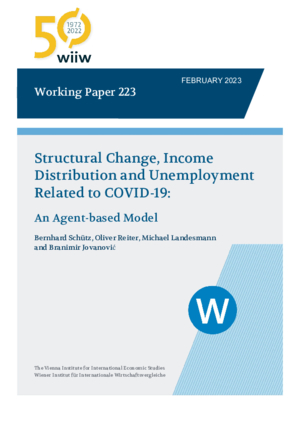Structural Change, Income Distribution and Unemployment Related to COVID-19: An Agent-based Model
Branimir Jovanović, Michael Landesmann, Oliver Reiter and Bernhard Schütz
wiiw Working Paper No. 223, February 2023
45 pages including 2 Tables and 27 Figure
We study the distributional consequences of COVID-19 by using a stock-flow consistent agent-based model that captures some of the aspects of pandemic-related lockdowns. In particular, the model distinguishes between ‘essential’ and ‘non-essential’ industries, between jobs that can be done from home and jobs that must be carried out on site, and takes into account that firms need to hire a certain amount of overhead labour. Allowing for government-financed short-time working schemes and loan guarantees, we find that these policies significantly reduce the rise in firm liquidations and income inequality (the ‘Keynesian’ result). However, we also find that the absence of government policies leads to higher levels of productivity and GDP in the aftermath of the crisis, as it means that more of the less productive firms face liquidation during lockdowns (the ‘Schumpeterian’ result). The last finding must be taken with adequate caution as our model is designed to describe the short run, while statements about the long run would require the inclusion of additional features such as technological progress and the entry of new firms.
Keywords: stock-flow consistent agent-based models, COVID-19, creative destruction, income inequality, short-time work, public loan guarantees
JEL classification: E24, E25, E65
Countries covered: Austria
Research Areas: Macroeconomic Analysis and Policy
